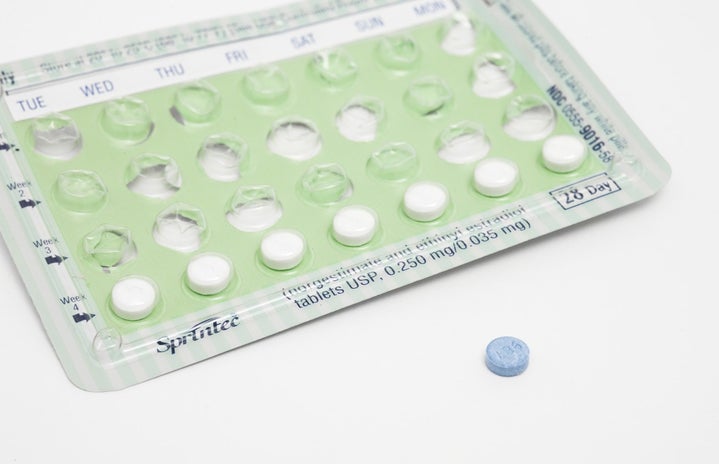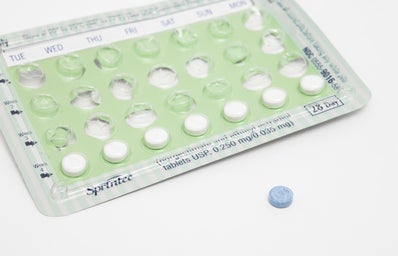Perhaps as some of you, I have had a terrible experience with “becoming a woman.” Terrible cramps, mood swings, extremely irregular periods, heavy periods, breast tenderness and an inexplicable affection for chocolate have been a constant throughout my teenage years after I first spotted a hint of blood in my underwear when I was only 11. For ten years, or 120 months, I had only been able to fully enjoy two out of the four weeks in every month at the most. Sometimes, not even that, unfortunately.
At the age of 15, I decided I had had enough. Especially as a swimmer, bloating, tenderness and cramps spoiled my experience in the pool even more than the effects of chlorine on my hair. I went to visit a gynecologist with my mother, and after half-listening to the issues I raised, he gave me a prescription. He told me this pill could have side-effects, but that the pros would outweigh the cons. It outweighed alright: I gained 11 pounds in a month and I had never before been so unsatisfied with my body.
Three months into the treatment, the negative side effects were mounting. It turned out that prior to taking the pill, I had no idea how bad mood swings could be. I had no motivation to do anything, my libido was negative and my appetite for chocolate had been replaced simply by… Well, appetite. That’s when I decided to pay another visit to my doctor, who, again, half-listened to my concerns while looking at his phone. He suggested switching my medication to ease these symptoms and so we did.
Again, three months in, the same effects persisted, and I decided it was time to go back to the (now obviously) good old days. As it turned out, at least the pill had one long-lasting effect: my periods became more regular. Still, I was unhappy with the situation, but I didn’t see any alternatives beyond accepting that I would never be like my best friend who had a 3-day period and no side effects. This is a burden I’ll have to learn to coexist, I thought at 16. Little did I know that four years after, I’d be period-free.
In my sophomore year at college, the conversations around “period” almost always followed-up conversations about heavy periods, cramps and headaches. A lot of my friends were just as unhappy as me, but my roommate who had recently gotten an IUD couldn’t relate. According to her, her periods were light, she had no breast tenderness anymore and her libido was on fire! Maybe I should learn more about, I thought to myself. After obsessively doing research online, I decided to consult with a professional.
The following week I scheduled an appointment with my doctor, and upon hearing my concerns she suggested a device called Kyleena. According to my doctor, this hormonal IUD would last five years and would decrease my flow beyond lightly alleviating the other symptoms. What’s more, it would act locally, meaning that the negative side-effects would be minimal. My biggest worry was that I would have to relive my pill days but she reassured me that would not happen. An IUD would prevent pregnancy, help relieve the tenderness and most importantly decrease my period flow. Suffice to say, it was love at first sight.
She scheduled my appointment with a gynecologist for later that month. Before the procedure, I took blood and urine tests in order to make sure that I did not have any STDs or the like, and then I was taken into a room for the insertion procedure. Now, while my experience was relatively easy, I have heard from other people that it was hell, so do take my account with a grain of salt. In any case, the insertion for me, was as painful as a pap smear and I’ve heard this comment from other people before. In three minutes the device had been inserted and I was free to go home and treat myself to froyo.
The following two months however, were indeed a bit hellish: I spotted in every underwear I had, meaning that I spotted essentially every day. If you don’t like seeing blood — this will definitely not be a good experience for you. Sometimes I bled little, sometimes a lot. However, I had been warned about this by my doctors so I knew that I had to go through hell to get to my current situation. Two months in, I had no periods whatsoever, and I still don’t.
Later on, my doctor informed me that this is not an unusual occurrence and it depends on how your body will react to the device. Granted, I do have light cramps and mood swings from time to time, as an IUD acts locally and therefore does not simply release hormones into your bloodstream. Still, this experience has been fantastic for me — no periods, no breast tenderness and no bloating, meaning I can swim anytime! Oh, and did I mention that it’s the most effective method of contraception, with a 99% success rate?
For anyone considering an IUD – I always recommend with reservation. While it has been an amazing experience for me, many of my friends have had dramatically different experiences. It all depends on your expectations, the type of IUD you decide to insert (copper/hormonal/size/timeframe) and how your body is going to react. Most recently, the IUD of one of my best friends was being rejected from her uterus and she had to have it removed, for example. This takes me to my next point: if you decide to get an IUD, always try and check your strings, or go to the doctor to see that the device is still in its rightful place.
I have had my IUD for 8 months now, and I’ve gotten it checked twice. So far, I have nothing to complain about! If you are considering one, and are struggling with problems similar to those I had in the past, I highly encourage you to schedule an appointment and check with your doctor whether you’d be a good candidate for the procedure. It’s definitely not for everything, considering that it is relatively painful and that the two-months after are not for the faint of heart. Still, for me, the long-term gains outweigh the short-term consequences and I decided to give it a try. Plus, if something does not work out or your body does not adapt to the device, the removal process is just as quick as the insertion, and you go back to your normal cycle within a couple of months.
As a reminder, my goal with this piece is to tell you about my own experience as I would to a friend on campus. This is obviously not a medical piece, nor it is intended to convince you to get an IUD. I simply want to share my own opinion with you to encourage you to get informed and learn more about your body and about the mechanisms that exist to ensure that we live healthy and comfortable lives. Especially with Sex Week coming to Harvard in the following days (check other HerCampus posts for more details) I think IUD’s are a very interesting and reliable source of contraception and many women that are either on the pill or considering another method to ease the effects of periods on their brain, soul and body, should consider learning more about. Oh, and many insurance plans cover the full cost, so do your research!
Xoxo,
Her Campus Harvard


